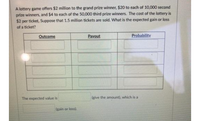
A First Course in Probability (10th Edition)
10th Edition
ISBN: 9780134753119
Author: Sheldon Ross
Publisher: PEARSON
expand_more
expand_more
format_list_bulleted
Concept explainers
Topic Video
Question

Transcribed Image Text:A lottery game offers $2 million to the grand prize winner, $20 to each of 10,000 second
prize winners, and $4 to each of the 50,000 third prize winners. The cost of the lottery is
$2 per ticket, Suppose that 1.5 million tickets are sold. What is the expected gain or loss
of a ticket?
Outcome
Payout
Probability
The expected value is
(give the amount), which is a
(gain or loss).
Expert Solution
This question has been solved!
Explore an expertly crafted, step-by-step solution for a thorough understanding of key concepts.
This is a popular solution
Trending nowThis is a popular solution!
Step by stepSolved in 2 steps

Knowledge Booster
Learn more about
Need a deep-dive on the concept behind this application? Look no further. Learn more about this topic, probability and related others by exploring similar questions and additional content below.Similar questions
- CHALLENGE 6.4.1: Adding and multiplying probabilities. ACTIVITY Start A game-show spinner has these odds of stopping on particular dollar values: 60% for $10, 20% for $25, 15% for $500, and 5% for $1000. What are the odds of a player winning $10 or $25? Ex: 12 Check Next ection? I6 9I Provide feedback acerarrow_forwardIn an experiment, college students were given either four quarters or a $1 bill and they could either keep the money or spend it on gum. The results are summarized in the table. Complete parts (a) through (c) below. Students Given Four Quarters Students Given a $1 Bill Purchased Gum Kept the Money 27 19 16 34 a. Find the probability of randomly selecting a student who spent the money, given that the student was given four quarters. The probability is (Round to three decimal places as needed.)arrow_forwardYou go to a carnival and pay $5 to play a game. The probability that you win the game is 0.4. If you win, you get $7. If you lose, you get nothing. Outcome value, x Win $7: Lose: Probability, P P = 0.4 What is the probability that you lose? b. Find the expected value of the game.arrow_forward
- Will pays $5 to play a game at an amusement park. He has a 25% chance of winning a $15 basketball. If he misses, he receives nothing. Outcome value Win: Lose: Probability 0.25 a. What is the probability that he will miss/lose? b. Find the expected value of the game.arrow_forwardIn a game of chance, players pay $5 for a chance to win one of two prizes: a $100 gift card or a $20 gift card. The probability of winning the $100 gift card is 0.006 and the probability of winning the $20 gift card is 0.07. Find the expected value (win or loss) per game.arrow_forwardHector plays a game with a friend. They pay $2 and roll a 6-sided die. If the die comes up a 3 or higher, they win $7. If it doesn't, they win nothing. What is the expected value of the game? Give your answer to the closest cent (two decimal places).arrow_forward
- Suppose you are invited to play a game in which you bet $1 on any number from 000 to 299. If your number comes up, you get $75. Find the expected winnings. Expected winnings = $ (Type an integer or decimal rounded to the nearest cent as needed.)arrow_forwarddurty 3arrow_forwardFind the expected payback for a game in which you bet $6 on any number from 0 to 499. If your number comes up, you get $500. The expected payback is $ (Round to the nearest cent as needed.)arrow_forward
- ♦️♦️❎✅❎❎❎❎arrow_forwardIn a coin and die game, you roll a fair six-sided die and toss a coin. If you roll a 6 and toss a tails, you gain $110. Otherwise, you lose $10. If you were to play the game 45 times, how much money can you expect to gain or lose? Round the expected value for one game to the nearest cent. Enter an expected loss as a negative number.arrow_forwardYou purchase a brand new car for $15,000 and insure it. The policy pays 78% of the car's value if there is an issue with the engine or 30% of the car's value if there is an issue with the speaker system. The probability of an issue with the engine is 0.009, and the probability there is an issue with the speaker system is 0.02. The premium for the policy is p. Let X be the insurance company's net gain from this policy. (a) Create a probability distribution for X, using p to represent the premium on the policy. Enter the possible values of X in ascending order from left to right. P(X) (b) Compute the minimum amount the insurance company will charge for this policy. Round your answer to the nearest centarrow_forward
arrow_back_ios
SEE MORE QUESTIONS
arrow_forward_ios
Recommended textbooks for you
 A First Course in Probability (10th Edition)ProbabilityISBN:9780134753119Author:Sheldon RossPublisher:PEARSON
A First Course in Probability (10th Edition)ProbabilityISBN:9780134753119Author:Sheldon RossPublisher:PEARSON

A First Course in Probability (10th Edition)
Probability
ISBN:9780134753119
Author:Sheldon Ross
Publisher:PEARSON
